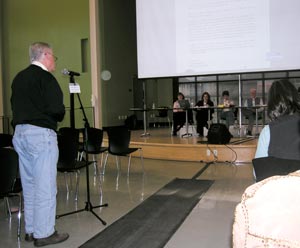A resolution proposed by a professor at Friday's Academic Senate meeting prompted an emotional response from both supporters and opponents before being referred to committee for further study.
A second resolution, commending Chancellor Blumenthal and Executive Vice Chancellor David Kliger for their efforts to ensure the safety of the campus community, was approved.
Anthropology professor Carolyn Martin Shaw proposed the initial resolution, which she said was intended to lessen the early use of "police, force, and arrests" during campus demonstrations.
"How should the university respond to [the disruption caused by demonstrations]? How should we respond when people are being uncivil?" Martin Shaw asked senate members during her presentation of the resolution.
Shaw offered the resolution because she felt that the use of pepper spray and batons by police on November 7--the first day of a four-month tree-sit--did not follow campus policies developed in the wake of 2005's "Tent University" controversy.
Shaw was chair of the Tent University and Restructuring Emergency Response Procedures Task Force, formed after the Tent University demonstration to provide guidance for similar protests in the future.
But in light of the ongoing tree-sit protest on Science Hill and the recent attack at the home of a UCSC researcher, many faculty, including a large number of scientists, were strongly opposed to the resolution.
Science faculty said the tree-sit--which began in the pre-dawn hours of November 7 and which later that day involved protesters opposed to the campus's Long-Range Development Plan--has left the Physical Sciences Building in lockdown. Faculty speaking at the meeting said the ongoing protest, in which demonstrators have committed acts of vandalism, including spreading human waste in science building bathrooms and setting off false fire alarms, has endangered faculty, staff, and students--and restricted student access to faculty.
"The tree-sitters and their supporters claim freedom of speech and freedom of expression," said Olof Einarsdottir, professor and chair of chemistry. "But their acts have denied the rights of serious students who want to attend classes and meet with faculty."
The problem is not the police response, added Martin Chemers, social psychologist and former acting chancellor. It's an increase in the level of violence on campus during the past few years.
"This is not your grandfather's demonstration," Chemers said. "This is a new, different kind of demonstration, and I don't think we should be imagining these to be just innocent college students trying to have a say in our deliberations."
Because of the recent escalation of violence related to protests, EVC Kliger announced his intention to establish a campuswide program in which differences can be discussed and resolutions reached.
"The goal of the program will be to model proactive conflict resolution strategies and expand alternative dispute resolution options for the UCSC community--administrators, faculty, staff, and students," Kliger said.
Many faculty were in favor of Martin Shaw's proposal, saying a framework for peaceful resolution and faculty involvement in demonstrations needs to be in place.
"I support this resolution wholeheartedly," said Paul Ortiz, associate professor of community studies. "I'm an unqualified supporter of the philosophical principles of nonviolence, and I believe that this resolution falls within those principles."
Anthropology professor Shelly Errington also offered support for the resolution but expressed surprise and regret over the impact recent actions have had on her science colleagues. "I have been swept away with the things our colleagues on Science Hill have been saying about what they've been suffering," said Errington. "This is really, really appalling."
She added, however, "the point is we do not have an effective way to bring together our campus to deal with this kind of demonstration . and this resolution is to try to get a dialogue going."
When Allen Van Gelder, professor of computer science, made a motion to send the resolution to the Senate's Committee on Faculty Welfare, participants agreed by a hand vote of 31 to 19.
Immediately following the vote, Joel Yellin, professor of environmental science and law, offered a resolution commending the chancellor and executive vice chancellor for their efforts to ensure the safety of the campus community. The resolution was approved by a vote of 23 to 16.
Asked about the fate of her resolution after the meeting, Martin Shaw said she thought it would not be seen again. "I think it will die in committee," she said.
Martin Shaw said her resolution was not about issues prompting the recent demonstrations--the LRDP, for example--but about how those incidents are handled. She had hoped to separate the two. "It didn't work. It was the wrong moment," she said.
No immediate changes regarding police response to demonstrations are planned, Chancellor George Blumenthal said after the meeting. But, he added, the meeting had underscored much common ground.
"We share the values of students to demonstrate peacefully," Blumenthal said. ""We will be working with Senate leadership to find the best way forward."



